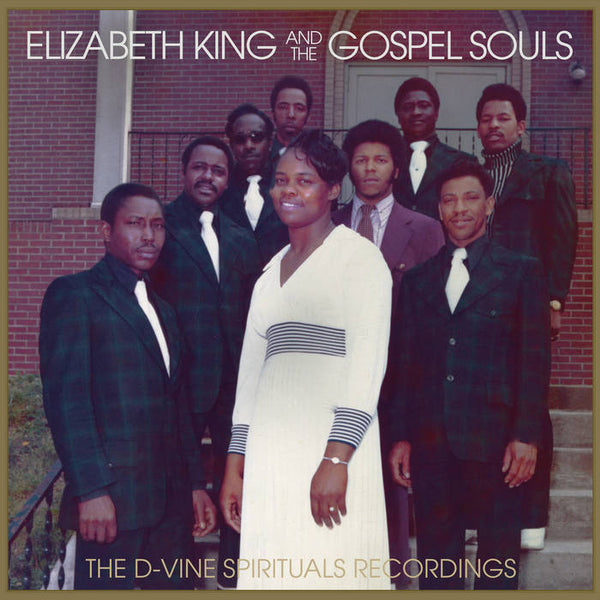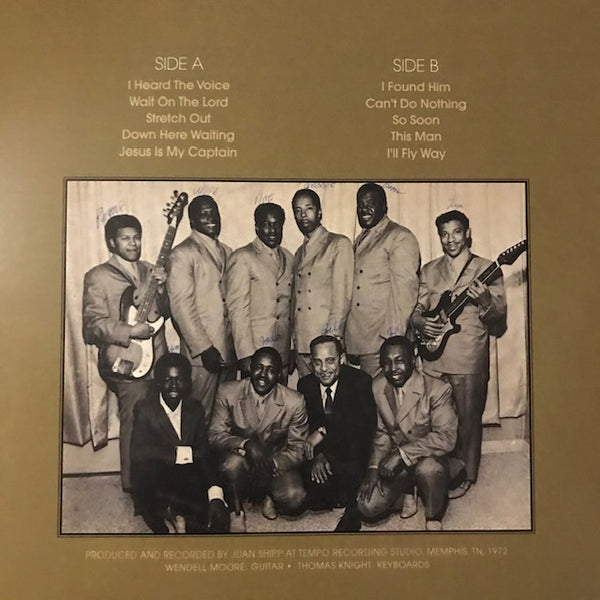Elizabeth King & The Gospel Souls – The D-Vine Spirituals Recordings – New LP
Stunning gospel recording from 1972, the vocals and guitar work on spot and so great, moving from bluesy reflective to jump-up funky, made in Memphis and built to bring you down to your knees and rise you up to them tippy toes on your tired feet. -- winch
Tracklist:
- I Heard The Voice
- Wait On The Lord
- Stretch Out
- Down Here Waiting
- Jesus Is My Captain
- I Found Him
- Can't Do Nothing
- So Soon
- This Man
- I'll Fly Away
“Going through your trials, I guarantee you, trouble gonna come and you need something. Music soothe your mind. You still be in pain but you can sleep,” says Elizabeth King of the power of gospel music, during a conversation upstairs at producer Bruce Watson’s Delta-Sonic Studio in her hometown of Memphis, TN.
This first reissue from the D-Vine Spirituals Recordings showcases King, who has an incredible ability to simmer and then raise the heat. The gospel hit from King’s pen, “I Heard the Voice” is only the tip of the iceberg. Witness her intensity on “Jesus Is My Captain,” with a wah-wah guitar grooving, which also drives the funky “Wait on the Lord.” “Down Here Waiting” is the very definition of a Memphis backbeat. “I Found Him” finds her singing, “I found him to be my hellhound chaser. I found him to be my midnight rider.” The traditional “I’ll Fly Away” is done here a la Chuck Berry’s “Maybellene,” fast and joyful.
Born in Grenada, MS, King grew up in Charleston to a mother who taught her to sing. “I would sing hymn songs,” she says. Often ill as a child, she turned to song as a way to get through. As she grew up, she learned to interpret them in her own style. She laughs as she says, “I like to move when I sing.”
Married and moving to Memphis in 1960, followed by a short stint in Chicago (“I couldn’t get used to the weather or how they went to church”), then back to Memphis, King first joined the Gospel Souls in 1969 after seeing them in concert. (The male vocal band had previously been on Halo Records and Designer Records, the latter catalogue explored in several exemplary Big Legal Mess releases.) She had always envisioned being backed by male singers. She was told, “If they got jealous wives, I wouldn’t.” But it worked out. She says, “I stayed 33 years with them.”
Producer Juan D. Shipp, a gospel DJ-cum-label impresario, thought he would get a richer sound than the gospel music studios in common use in Memphis at the time when he stumbled on Tempo Studios downtown, which became his go-to. “It was a compact studio but boy did it sound good,” Shipp recalls, continuing, “You had to walk up the stairs to it.” He first recorded King and the Gospel Souls in 1972, issuing “I Heard The Voice” (which was later sub-leased to the Messenger label).
Shipp continues, “When you come to the studio, I worked the devil out of you to make it what it should be. We were working at ‘I Heard The Voice.’ I said, ‘Sing it like you making love to God.’ That song skyrocketed. It was 5½ years at #1. Nobody could sing it like the original!”
Shipp brought in Lynn Askew on guitar and musicians affiliated with Tempo Studios for the rhythm section and keys.
Working a day job for a florist, she was in a serious car accident that inspired “I Heard The Voice” B-side “Waiting on the Lord.” King says, “I had no feeling in my body. I couldn’t do nothing but pray. The fire department had to cut me out of it. I thought about it that day, that song.” She still has pain in her body every day.
When the single was released, it caught on quickly. “I was riding down Union Ave.,” says King. “Rev. Shipp, he was on [the radio]. I say, ‘What,’ turn up the radio real loud. A guy from Memphis was at the red light. I said, ‘It’s me!.’ Every day, look like every twenty minutes, they was playing it. The phone started to ring. It kept us going everywhere.”
In order for King and the Gospel Souls to tour, but keep their day jobs and church commitments in town, they would hit the road on weekends, playing Saturday night and Sunday evening, eating after each concert, and driving back to Memphis in time to be at work by 8AM Monday morning. Plus, King would attend church services during the weeknights and work on choir rehearsals on Tuesday nights.
The band was once asked to perform for inmates at the Tennessee State Prison farm near downtown Nashville, TN. “Everything was on lockdown ‘cause womens was fighting. I was so scared. You talk about somebody singing that day: I sang!,” says King.
The last two songs on this collection are sung by Walter Boone (on “So Soon”) and John Powell (“on This Man”), lead singers of the band before King joined. Even with her on board, they would take a solo or two at longer concerts.
King went on to raise 15 children and still sings in church, as well as on WMQM-AM Memphis on Saturday mornings around 10AM.
Askew later worked in construction, painting, and as a mechanic, but tragically died on the job.
King says she hopes this recording keeps people focused on the soul, saying, “You need joy. If you mind got joy, if you keep your mind set on Jesus, he give you perfect peace.”







![Wright, O.V. – .A Nickel and a Nail...The Best of... [2xLP] - New LP](http://store.greennoiserecords.com/cdn/shop/files/thumbnail_IMG_4632_94f54f01-f8a9-4f8a-be38-a5a3aa868730_{width}x.jpg?v=1690098448)
![Various Artists – The Daptone Super Soul Revue LIVE at the Apollo [3xLP Translucent Teal Vinyl MARKED DOWN]– New LP](http://store.greennoiserecords.com/cdn/shop/products/a3080002584_16_{width}x.jpg?v=1633102639)